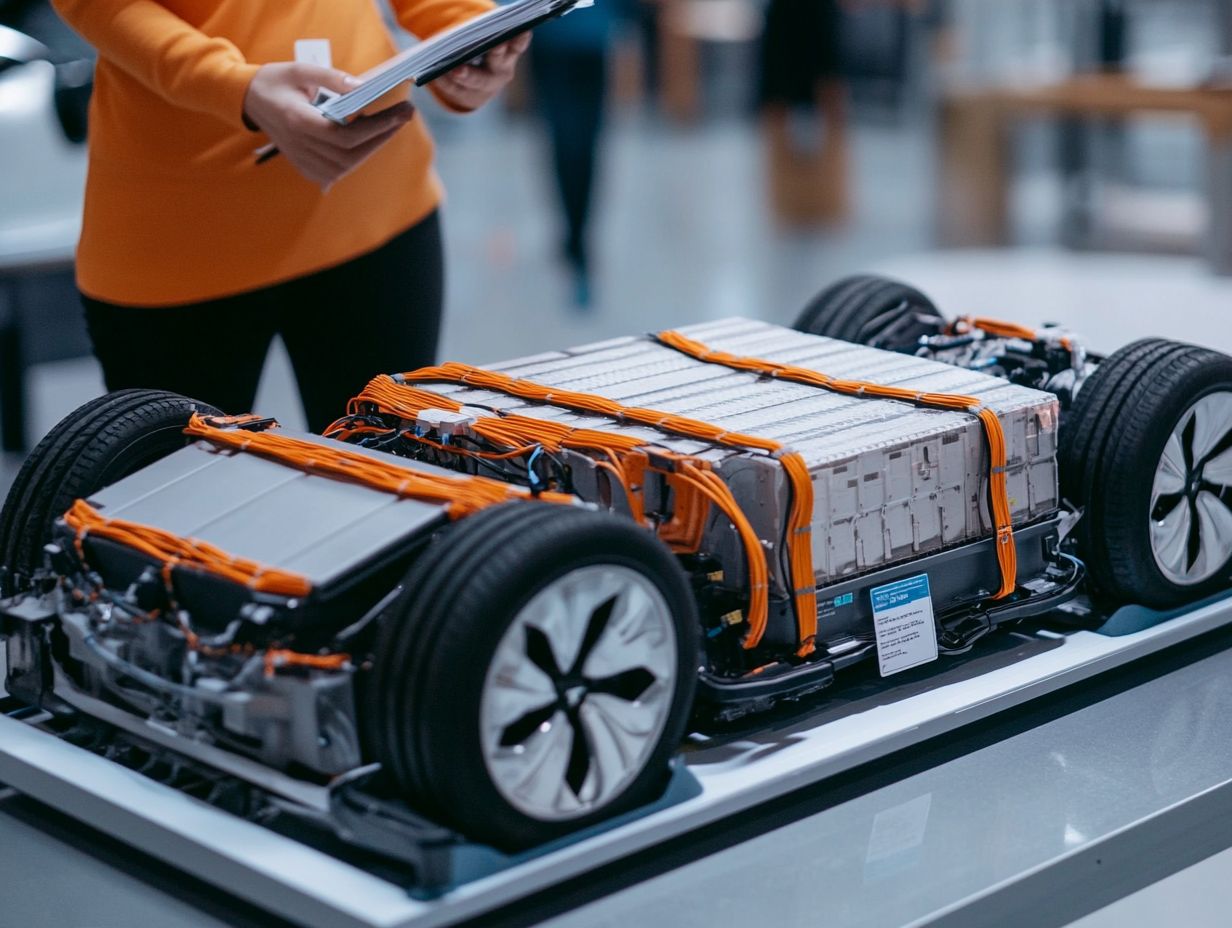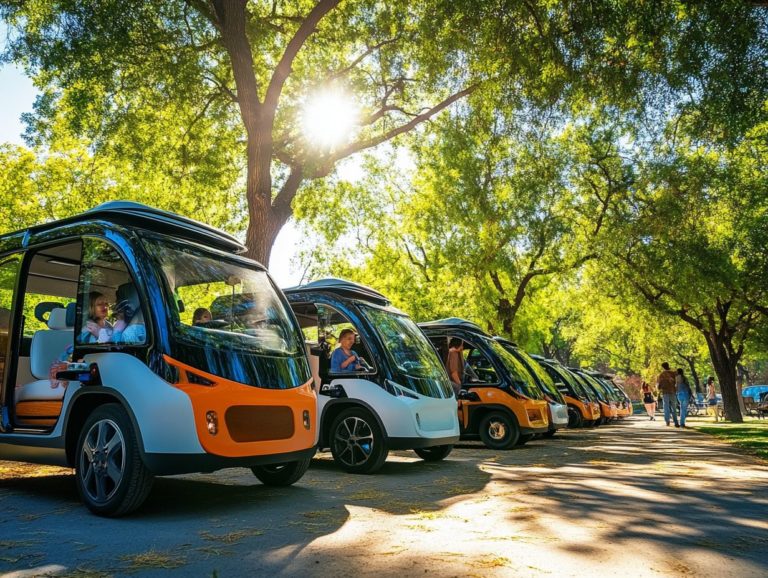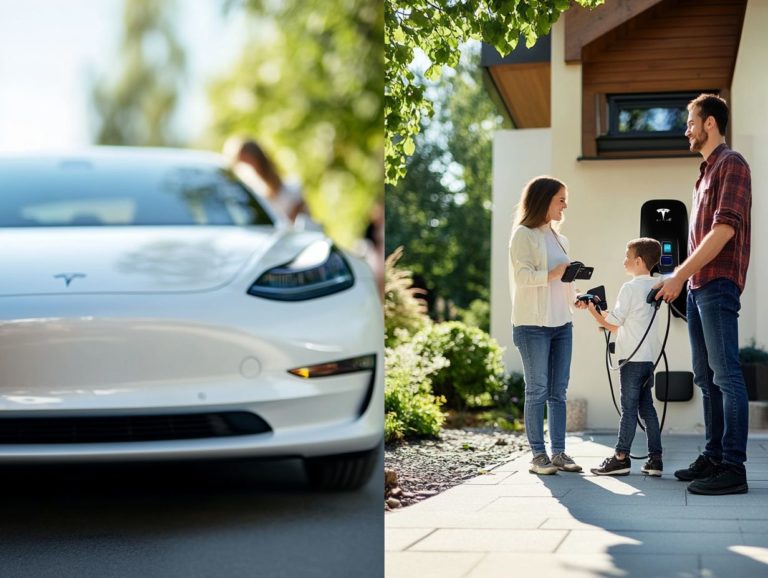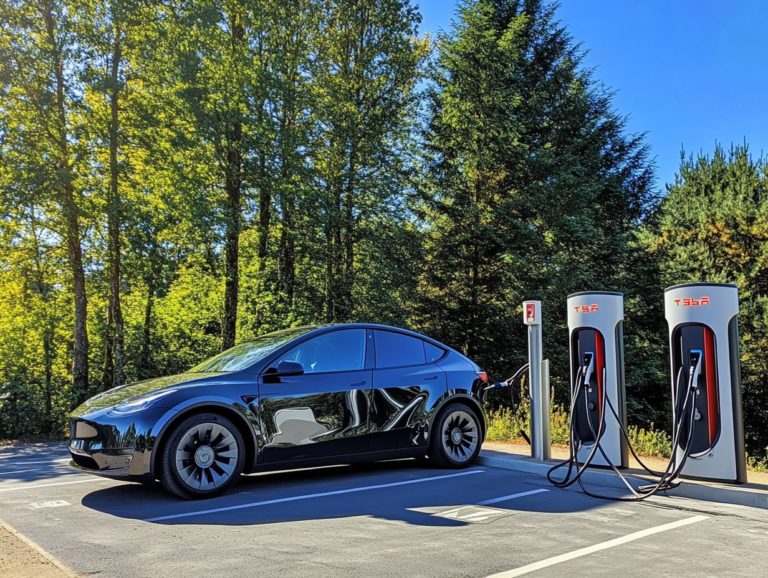Comparing EV Battery Options for New Buyers
As electric vehicles (EVs) grow in popularity, understanding the different types of batteries that power them becomes essential for you as a potential buyer.
Let s explore the key factors you need to consider when choosing an EV battery, including range, charging time, cost, and environmental impact. It offers a comparison of popular battery options lithium-ion, nickel-metal hydride, and solid-state while providing valuable insights to empower your decision-making process.
Whether you’re new to the world of EVs or seeking an upgrade, this guide is designed to help you navigate the ever-evolving landscape of electric vehicle batteries with confidence.
Contents
- Key Takeaways:
- Types of Batteries Used in EVs
- Key Factors to Consider When Choosing an EV Battery
- Comparing Different EV Battery Options
- Making an Informed Decision
- Frequently Asked Questions
- 1. What should I consider when comparing EV battery options as a new buyer?
- 2. How do I know which EV battery option is right for me?
- 3. Can I upgrade my EV battery in the future?
- 4. How does the cost of an EV battery compare to a traditional gasoline car?
- 5. What is the average lifespan of an EV battery?
- 6. Are there any eco-friendly EV battery options available?
Key Takeaways:

- Consider range, charging time, cost, longevity, and environmental impact when choosing an EV battery.
- Lithium-ion batteries offer the longest range and fastest charging time, while solid-state batteries are more expensive but have a longer lifespan.
- Make an informed decision by assessing your needs, consulting with experts, and test driving different EV options.
Types of Batteries Used in EVs
Understanding the different types of batteries used in electric vehicles, such as lithium-ion, nickel-metal hydride, and solid-state batteries, is essential for you as a potential buyer. Additionally, knowing how charging needs impact your EV choice can greatly influence your decision.
These battery types significantly impact not only the driving experience but also the performance and overall cost of electric vehicles. To ensure you choose wisely, it’s essential to know what to look for when buying an EV. Understanding these nuances can enable you to make a well-informed decision about your electric vehicle ownership journey.
Key Factors to Consider When Choosing an EV Battery
When selecting an EV battery, it’s essential to thoughtfully consider key factors such as driving range, charging time, overall cost, longevity, and performance. For more insights, learn how to compare EV models effectively. This careful evaluation ensures that the electric vehicle aligns perfectly with your personal preferences and budgetary requirements.
Battery Range and Charging Time
Battery range and charging time are crucial considerations for you as an EV owner. They essentially dictate how far you can travel before you need to recharge your battery and how swiftly you can return to the open road.
These elements are significantly influenced by factors such as battery capacity and how much energy the battery can store in relation to its size, which are vital in determining an electric vehicle s overall performance. Take the Tesla Model 3, for example; its larger battery capacity allows it to cover longer distances on a single charge when compared to the Nissan Leaf.
You should also consider the charging methods available. Fast-charging stations can dramatically reduce your downtime, enabling you to quickly replenish your battery during long journeys. Meanwhile, home charging might provide a slower yet practical solution for daily use, especially if you have a reliable overnight setup.
Cost and Longevity
The initial cost and longevity of an EV battery are central to your financial considerations when it comes to electric vehicle ownership, affecting your budget and any potential savings you might reap from available EV incentives.
For many prospective EV owners, understanding these costs extends far beyond the sticker price at the dealership. The battery constitutes a significant portion of the overall purchase price, and its lifespan and efficiency directly influence future expenses tied to maintenance and replacement. An efficient battery can dramatically lower your total ownership costs over time, making it an essential element in your long-term budgeting strategy.
Fortunately, various government incentives and rebates can help offset some of these upfront expenditures, enabling you to compare short-term costs with potential long-term savings more effectively.
By evaluating these factors thoughtfully, you can ensure that you maximize your investment in electric mobility.
Start exploring your options today and drive into the future with confidence!
Environmental Impact

The environmental impact of EV batteries, including recycling practices and sustainability efforts, is something you should consider if you’re an eco-conscious consumer eager to minimize your carbon footprint.
As demand for electric vehicles continues to surge, grasping the entire life cycle of these batteries becomes increasingly crucial. From the extraction of raw materials to the manufacturing stage, the process involves considerable energy consumption and resource allocation.
However, advancements in technology are paving the way for more sustainable practices that emphasize recycling and the reuse of battery components. Efforts to develop efficient battery disposal methods not only cut down on waste but also contribute to a circular economy.
By making informed choices about battery technology and its life cycle, you can make a big difference! This is essential for a greener future while driving the transition towards cleaner transportation alternatives.
Comparing Different EV Battery Options
When you compare various EV battery options, it’s crucial to grasp the differences between lithium-ion, nickel-metal hydride, and solid-state batteries. This understanding will enable you to identify the technology that aligns perfectly with your performance expectations and energy storage requirements.
Lithium-Ion Batteries
Lithium-ion batteries stand as the most commonly utilized battery type in electric vehicles, celebrated for their high energy density and impressive battery capacity. This makes them the go-to choice for both manufacturers and consumers.
These sophisticated power sources offer remarkable benefits, such as fast-charging capabilities. This enables electric vehicles to recharge significantly quicker than older technologies like nickel-metal hydride or lead-acid batteries.
Many EV models equipped with lithium-ion batteries showcase impressive ranges on a single charge. This alleviates the concerns of ‘range anxiety’ often associated with electric driving.
The lightweight design of lithium-ion technology boosts the vehicles’ efficiency and enhances their on-road performance. This allows for better acceleration, and when compared to alternatives like solid-state batteries, lithium-ion systems strike a well-balanced compromise between cost-effectiveness and performance.
Nickel-Metal Hydride Batteries
Nickel-metal hydride batteries, though not as ubiquitous as lithium-ion batteries, still hold significance in the electric vehicle market, particularly in hybrid models. Their ability to strike an effective balance between cost and performance makes them a compelling choice.
One of the standout features of these batteries is their longevity and durability, outshining many lithium-ion alternatives. These batteries can endure high temperatures and ensure they operate efficiently in various climates a crucial aspect for vehicles like the Toyota Prius Prime.
However, it’s important to acknowledge their drawbacks. With a lower energy density, these batteries offer less driving range compared to their lithium-ion counterparts.
As a result, while they play a crucial role in the hybrid market, the automotive industry is continuously evaluating the potential benefits of shifting to lithium-ion technology for fully electric models.
Explore your options today to find the perfect battery for your needs!
Solid-State Batteries
Solid-state batteries lead the charge in innovation within the electric vehicle (EV) sector. They offer remarkable benefits, including enhanced safety, greater energy density, and longer lifespans compared to traditional batteries.
This emerging technology addresses the growing demand for sustainability and greener energy solutions. Solid-state batteries not only meet consumer needs for longer-range electric vehicles but also greatly reduce risks like flammability and overheating.
As automakers and energy companies invest more in research and development, market indicators show a potential surge in solid-state battery adoption. This shift has the power to transform energy storage in vehicles. However, challenges like production scalability and high manufacturing costs still need to be tackled for widespread implementation to become a reality.
Making an Informed Decision

Evaluate your needs and driving habits to make the best choice regarding your EV purchase or lease. For more insights, learn how to choose the right EV for your lifestyle. Consult with experts and conduct comprehensive test drives to effectively assess battery health and performance.
This thoughtful approach ensures you select the EV that aligns perfectly with your lifestyle.
Assessing Personal Needs and Priorities
When selecting an electric vehicle, it’s vital to assess your personal needs and priorities. Factors such as budget, driving habits, and range requirements will significantly influence your decision.
Understand your daily commute; if it’s shorter, you may benefit from more flexible charging options. Also, evaluate the availability of charging infrastructure in your area. This helps you determine if you can conveniently recharge at home or need to rely on public charging stations.
It’s wise to consider your overall budget, factoring in not just the purchase price of the electric vehicle but also ongoing costs such as insurance, maintenance, and energy expenses. Balancing these elements will lead you to the choice that best fits your lifestyle.
Consulting with Experts and Test Driving
Consulting with industry experts and taking the time for test drives are crucial steps in your journey to selecting the perfect electric vehicle. These steps provide valuable insights into battery health and performance metrics.
Expert advice can reveal critical insights about charging capabilities, range expectations, and maintenance needs information that often falls through the cracks of standard specifications.
Test driving various models further enhances your understanding. It allows you to experience firsthand how each vehicle handles on the road, which can vary significantly.
Observing their performance in real-world conditions clarifies aspects like acceleration, ride comfort, and technology features. Consider multiple models for comparison to make informed decisions, leading to satisfaction with your chosen electric vehicle.
Frequently Asked Questions
1. What should I consider when comparing EV battery options as a new buyer?
When comparing EV battery options, key factors include the battery’s range, charging time, cost, and warranty. It’s essential to find a battery that suits your driving needs and budget, which is why understanding different EV battery types is crucial.
2. How do I know which EV battery option is right for me?

To determine the right EV battery option, consider your daily driving habits. If you have a long commute, you may prefer a battery with a longer range. To learn more about assessing your needs, check out how to evaluate EV range before buying. Alternatively, if you have access to a fast charger, a battery with a shorter charging time might be ideal.
For more information on the latest EV options, feel free to explore our website!
3. Can I upgrade my EV battery in the future?
In most cases, you can upgrade your EV battery. Check with the manufacturer or local dealership for options and costs. Remember, upgrading might impact your warranty.
4. How does the cost of an EV battery compare to a traditional gasoline car?
The cost of an EV battery varies by model and manufacturer. Generally, they can be pricier than traditional car batteries.
However, they can save you money over time due to lower fuel and maintenance costs.
5. What is the average lifespan of an EV battery?
An EV battery typically lasts around 8 to 10 years. This lifespan varies with usage and maintenance.
Research the specific battery and its warranty before buying.
6. Are there any eco-friendly EV battery options available?
Great news for eco-warriors! Some manufacturers provide eco-friendly EV batteries. These use sustainable materials and have less environmental impact.
They may cost more, but help reduce your carbon footprint and promote a greener future.






